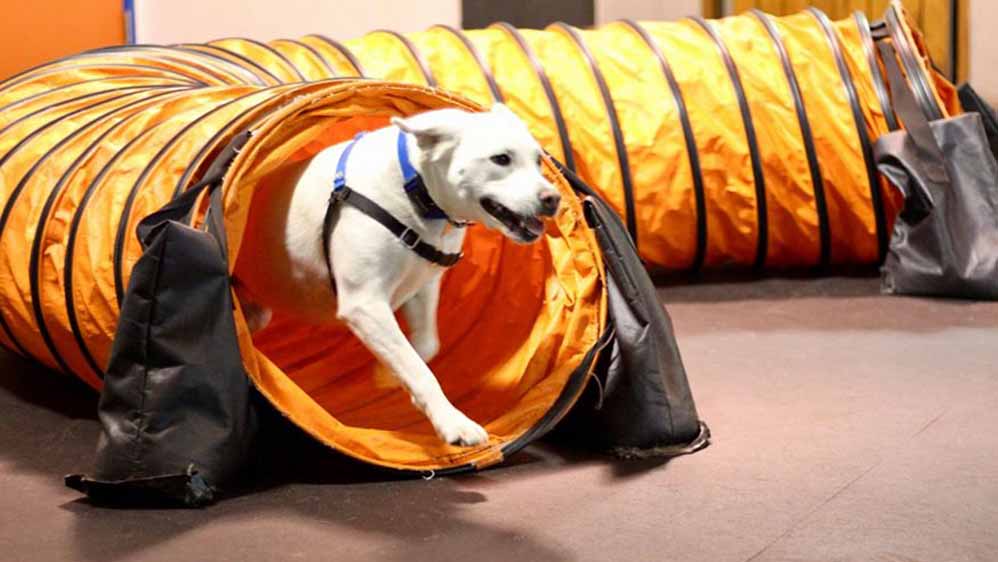Exactly How to Include Games into Your Dog Training Routine
Exactly How to Include Games into Your Dog Training Routine
Blog Article
Vital Tips for Successful Dog Training: An Overview for Pet Dog Owners
Effective canine training is a diverse process that requires a calculated technique customized to both the animal's personality and the owner's purposes. Trick components such as developing regular commands, employing positive support, and facilitating early socializing play critical functions in cultivating a well-adjusted canine friend. However, numerous pet dog proprietors come across challenges that can hinder progression, causing frustration and uncertainty. Understanding exactly how to navigate these barriers can dramatically improve the training experience, inevitably changing the connection in between owner and canine. What are the necessary methods that can be utilized to ensure success in this venture?
Recognizing Canine Behavior
Recognizing pet dog behavior is vital for reliable training and cultivating an unified relationship in between dogs and their proprietors. dog training. Canines interact mostly with body language, vocalizations, and activities, making it crucial for proprietors to translate these signals properly.

Socialization plays a considerable role in pet dog actions; direct exposure to various atmospheres, individuals, and other pets can dramatically influence a pet's character. In addition, variables such as type characteristics and private temperament ought to assist training approaches, as some types may have particular behavior traits that demand tailored approaches. By understanding these components, owners can produce a helpful atmosphere that encourages favorable actions, causing successful training outcomes and a much deeper bond with their pet dogs.
Developing Consistent Commands
Efficient interaction with your pet begins with developing constant commands. This foundational aspect of training is essential for promoting understanding between you and your family pet. Uniformity in the commands you make use of ensures that your pet can accurately link details words or expressions with the wanted behaviors.
When choosing commands, select clear, unique words that are very easy to state and distinguish from each other. Stay clear of utilizing similar-sounding commands that may confuse your pet dog. As an example, using "rest" and "stay" is appropriate, but "sit" and "hit" might lead to misunderstandings.
Additionally, maintain the exact same tone and quantity for every command. Pet dogs are sensitive to vocal signs, so varying your tone can develop confusion.
It is similarly essential to make sure that all member of the family get on the same page regarding the commands made use of. A united front in command use will stop mixed signals and enhance the learning process.
Positive Support Techniques
The power of favorable support in pet training depends on its capability to motivate desired behaviors through incentives and praise. This strategy is grounded in the concept that habits complied with by desirable results are more most likely to be duplicated. By incorporating favorable support into your training routine, you can properly shape your pet's actions in a useful fashion.
To carry out positive reinforcement, it's necessary to determine what inspires your pet, whether it be deals with, toys, or spoken praise. When your pet carries out a desired action, such as resting on command, immediately award them with a treat or love. This organization between the command and the favorable end result reinforces their understanding.
It's vital to timing the rewards appropriately; supplying the support within secs of the preferred habits assists your dog make the connection (dog training). Additionally, consistency is essential-- guarantee that all relative make use of the same commands and benefit systems to prevent confusion

Slowly, you can reduce the regularity of treats as your dog learns the behavior, transitioning to applaud or intermittent rewards. This method not only fosters a solid bond in between you check my site and your pet dog but also promotes a positive knowing atmosphere, making educating an enjoyable experience for both.
Socialization and Interaction
Consistently exposing your pet to a range of environments, individuals, and various other animals is critical for their social development. Socializing must start early, preferably during the critical window of 3 to 14 weeks, when pups are most responsive to brand-new experiences. Nonetheless, older canines can additionally take advantage of continuous socialization initiatives.
Present your pet dog to different setups, such as parks, pet-friendly shops, and metropolitan locations. This direct exposure assists them adjust to various stimulations, reducing anxiousness and concern feedbacks. Motivate favorable interactions with other dogs and people, ensuring that these encounters are controlled and secure to foster confidence.
Make use of structured playdates with courteous pet dogs, as this can improve your dog's social abilities and show them proper habits. Obedience courses and training sessions likewise offer exceptional opportunities for socialization, enabling your pet to connect with others in a supervised atmosphere.
Display your dog's body language throughout communications, as this will aid you evaluate their convenience level. Gradually raise exposure to even more difficult situations while ensuring that each experience is positive. A well-socialized canine is most likely to display balanced habits, making them a pleasure to have in any type of setting.
Addressing Common Training Challenges
Every pet dog owner will run into training challenges at some factor, despite their dog's age or socialization degree. Identifying common problems such as stubbornness, interruptions, and fearfulness can help in establishing reliable techniques you can try these out for improvement.

Disturbances during training sessions can derail emphasis. To combat this, start training in a peaceful environment with marginal stimuli. Slowly present interruptions as the pet dog ends up being extra skillful in commands. Short, frequent training sessions are also reliable in keeping focus.
Fearfulness can hinder a dog's knowing procedure. Progressive desensitization to the source of concern, coupled with favorable support, can help ease anxiousness. Perseverance is critical; never compel a canine right into a circumstance that triggers distress, as this may exacerbate the issue.
Eventually, understanding and addressing these usual obstacles with an organized approach will certainly foster an extra effective training experience, enhancing the bond in between pet dog and owner while promoting reliable discovering.
Verdict
In recap, effective dog training depends on a comprehensive understanding of canine behavior, the establishment of constant commands, and the application of favorable reinforcement strategies. Socialization plays a vital role in creating well-adjusted pet dogs, while resolving common training challenges needs patience and flexibility. By executing these important approaches, animal owners can foster a solid bond with their canines and promote preferable actions, eventually resulting in an unified partnership in between human beings and their canine companions.
Understanding dog habits is vital for effective training and fostering an unified partnership between canines and their proprietors.Socialization plays a considerable function in canine behavior; exposure to numerous settings, individuals, and other pets can significantly impact a pet's character.The power of favorable support in pet training exists in its capability to urge wanted behaviors through benefits and praise. By integrating positive reinforcement into your training regimen, you can efficiently form your dog's habits in a useful way.
In recap, effective dog training depends on a thorough understanding of canine actions, the establishment of constant commands, and the application Discover More of favorable reinforcement techniques.
Report this page